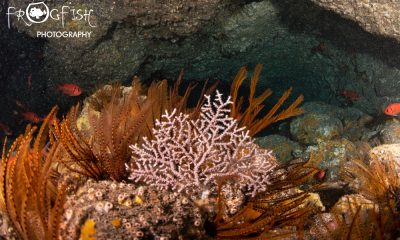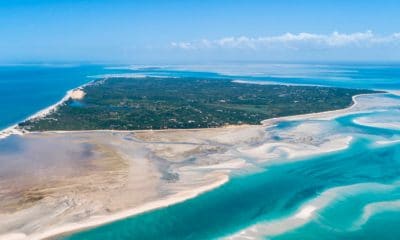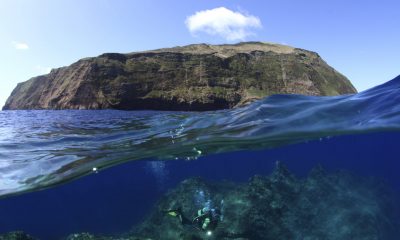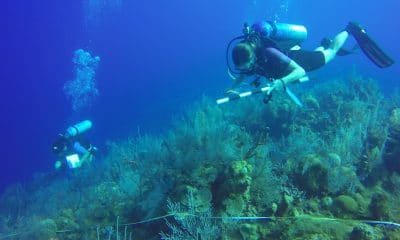News
National Marine Aquarium Asked To Drop Fish From Menu
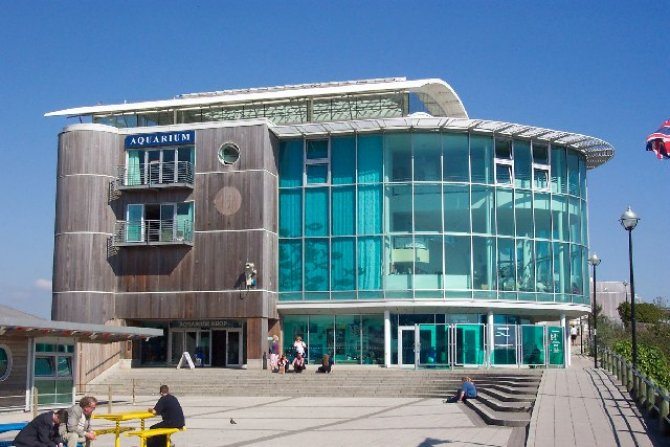
On the 19th Feb PETA (People for the Ethical Treatment of Animals) wrote to the Plymouth National Marine Aquarium calling on policy-makers to stop serving dead fish at in-house restaurants – a practice that contradicts the aquarium’s invitation to the public to appreciate the wonder of living fish.
I have long been aware of the pain and stress we put marine animals through when killing them for food, as well as the immense disregard for the fragile ecosystem that supports them. I know from personal experience the great work the Plymouth National Marine Aquarium does for marine research and public awareness of our oceans, but having a fish restaurant is sending confusing and mixed messages about conservation and animal welfare. Surely they should be leading the way into researching alternative food sources that can be equally financially beneficial as well as ethical.
If you are interested by the following article please write your own letter to Dr David Gibson, Managing Director, National Marine Aquarium or copy the one below and let him (and us) know your feelings. This topic will be opened up in our Forum Pages.
PETA – “Experts agree that fish are sensitive, interesting animals who feel pain and have complex social structures. No one – particularly a facility that is supposed to promote respect for sea life – needs to put them on the menu”, says PETA Director Mimi Bekhechi. “The rise of so many delicious, readily available faux-fish dishes means visitors can enjoy a tasty meal without slaughtering animals.”
Biologists have found that fish develop relationships with each other and grieve when their companions die. Some fish are capable of using tools, while others gather information by eavesdropping. These intelligent, sensitive animals are so good-natured that Dr Sylvia Earle, the world’s leading marine biologist, has said, “I wouldn’t deliberately eat a grouper any more than I’d eat a cocker spaniel”. PETA, whose motto reads, in part, that “animals are not ours to eat”, encourage all caring people to choose tasty vegan options.
Their letter reads:
Dr David Gibson, Managing Director, National Marine Aquarium
From: Dawn Carr, PETA
10 February 2015
Dear Dr Gibson,
I’m writing from People for the Ethical Treatment of Animals (PETA) UK on behalf of all the fish in the sea to ask the National Marine Aquarium to end the sale of seafood in its cafés. The National Marine Aquarium advertises itself as a place where people can cultivate an understanding of and admiration for sea animals. Yet after inviting people to look on these glorious, fascinating animals in awe, it’s odd that your cafés then invite people to stick a fork in them. Serving fish in an aquarium is like serving monkey nuggets at a zoo.
Talk of “sustainable seafood” fails to consider the implications for individual fish, but the fact remains that the seafood in your cafés is made from living sea animals who treasured life and were needlessly subjected to pain and fear.
And human consumption of sea animals is the very cause of the catastrophic destruction of life in the Earth’s oceans. Fish farms introduce non-native animals into sensitive ecosystems, and commercial fishing ships “clear-cut” the ocean floor and inadvertently maim and kill billions of non-target marine animals, including porpoises and sea lions. By encouraging people to eat sea animals, you perpetuate the problem.
Although fish may not always express suffering in ways that humans can easily recognise, experts around the world agree that fish are sensitive, interesting animals who feel pain and have complex social structures. In fact, a 2014 study from the University of Cambridge showed that fish have good memories, work collaboratively to achieve goals and have cognitive abilities that can actually surpass those of dogs and some primates. Leading marine biologist Dr Sylvia Earle said, “You know, fish are sensitive, they have personalities, they hurt when they’re wounded”.
She has also said, “I used to eat all kinds of seafood, but I know too much now. Both about how I value them alive and as individual components of what makes the world work. I’d much rather see grouper swimming in the ocean than swimming in butter with lemon slices”.
I do hope you’ll agree with her and instead consider offering your visitors animal–friendly seafood options, such as fish-free fish fingers, faux-fish cakes and even vegetarian prawns. These options are delicious, environmentally friendly and free of the toxins and cholesterol found in fish flesh and – most importantly – no one has to die for them!
Please let us know that you’ve made the responsible decision to stop serving marine animals in the National Marine Aquarium’s cafés. I can be reached at DawnC@peta.org.uk or on 020 7837 6327, extension 226. Thank you for your consideration.
Kind regards,
Dawn Carr
Manager
Special Projects
The Plymouth Herald published a reply from the Aquarium in which Dr Gibson says:
“We work to educate consumers and our visitors on the importance of eating fish and seafood that has been sourced in a sustainable way, to help nurture a sympathetic understanding of our oceans.
“All fish and seafood served in the aquarium cafe is ethically sourced and MSC compliant.
“We have a robust purchasing policy in place that is proactive in sustainable and seasonal fish, ensuring we maintain the highest levels of sustainable fish sourcing practices possible.”
Dr Gibson said the aquarium aims to educate consumers on how best to source and eat fish and seafood responsibly.
He added: “We’ve also spearheaded a number of initiatives, including helping Plymouth to win the world’s first Fish2fork Blue Fish award and our current campaign for Plymouth to become a Sustainable Fish City.”
This statement from Dr Gibson is of a type I have heard many times before and in my opinion it simply tries to justifiey and rationalise the insidious demise of our seas.
What do you think? Head over to the Scubaverse Forums to let us know.
Gear News
Introducing the TR-80, IR-50 and CS-30 Regulators from DYNAMICNORD

Whether you are a beginner or a professional diver – with the three new main regulators from DYNAMICNORD, everyone will find their favourite regulator. They all look super stylish.
Excellent performance with the TR-80
Quality and performance are the be-all and end-all for regulators. It is not for nothing that the TR stands for Tec Reg. The innovative design of the TR-80 guarantees absolute reliability – even in ice-cold waters.

Perfect breathing effort at 0.8 J/l / certified for diving in waters below 10 degrees / structural design made of solid brass for best cold protection / membrane-compensated design with dry seal of the first stage / reduced exhalation effort thanks to optimized exhalation membrane and bubble deflector / adjustable Venturi (dive/predive) and adjustment knob for individual inhalation comfort / innovative design of the front cover prevents free-flow in strong currents or when diving with scooters / design made of sandblasted brass, matt chrome finish / 2 HP and 4 LP outlets / mouthpiece made of high-quality, anti-allergic silicone for maximum comfort.


Amazing underwater adventures with the IR-50
The IR-50 is the top regulator for advanced and experienced divers. Natural breathing is the essence of this regulator.

Ideal breathing effort at 0.8 J/l /certified for diving in waters below 10 degrees / compensated membrane / adjustable venturi (dive/predive) and adjustment knob for individual inhalation comfort/ outlet valve and deflector for minimum exhalation effort and reduction of bubbles on the face / design made of sandblasted brass, matt chrome finish / 2 HP and 4 NP outlets / mouthpiece made of high-quality, anti-allergic silicone for maximum comfort.


The Workhorse – our CS-30
For diving centres and diving beginners – the workhorse stands for strong construction, reliability and robustness. Perfect for your training.

Optimal breathing effort at 0.8 J/l /recommended for diving in waters above 10 degrees / non-compensated piston / adjustable venturi (dive/predive) / outlet valve and deflector for minimum exhalation effort and reduction of bubbles on the face / design made of sandblasted brass, matt chrome finish / 1 HP and 3 NP outlets / mouthpiece made of high-quality, anti-allergic silicone for maximum comfort.


Octopus OP-30
The OP-30 is the ideal addition to all DYNAMICNORD regulators. It is identical in construction to the CS-30.

The TR-80, IR-50, CS-30 (DIN & INT) regulators and the Octopus OP-30 are available from DYNAMICNORD dealers and in the online store.
DYNAMICNORD – Your Outdoor Companion.
Marine Life & Conservation
Paul Watson Released as Denmark Blocks Japan’s Extradition Bid

Renowned anti-whaling activist Paul Watson has been released from custody in Greenland after spending five months in detention. Denmark’s Justice Ministry rejected Japan’s request for his extradition, citing insufficient guarantees that his time already served in custody would be credited against any potential sentence.
The 74-year-old Canadian-American was arrested on July 21 in Nuuk, Greenland’s capital, when his ship docked to refuel. His arrest was based on a 2012 Japanese warrant related to a 2010 encounter in Antarctic waters. Japan alleged Watson obstructed operations and caused damage to a whaling research ship during efforts to disrupt illegal whaling. Watson has consistently denied these claims, maintaining his commitment to marine conservation.
Denmark, which oversees extradition matters for Greenland, concluded that while the legal conditions for extradition were met, the lack of assurances from Japan regarding time-served credit made extradition untenable.
In a video shared by his foundation, Watson expressed gratitude and relief, saying, “After five months, it’s good to be out… and good to know they’re not sending me to Japan.” He added that the most difficult part of his time in custody was being separated from his two young sons.
Watson is a pioneering figure in marine conservation, known for founding the Captain Paul Watson Foundation in 2022 after decades of activism with the Sea Shepherd Conservation Society. His bold efforts to defend marine life have earned him widespread support, including from celebrities and conservationists. His work has also been featured in the acclaimed reality TV series Whale Wars.
Watson’s lawyer, Jonas Christoffersen, praised the decision, stating, “We are happy and relieved that Paul Watson is now free.” He added that Watson is eager to reunite with his family and continue his vital work.
The arrest occurred while Watson’s vessel, the M/Y John Paul DeJoria, was en route to the North Pacific with a team of 26 volunteers to intercept a Japanese whaling ship. His foundation described the arrest as politically motivated and emphasized that Watson’s actions were focused on ending illegal whaling practices.
Japan resumed commercial whaling in 2019 after leaving the International Whaling Commission, asserting that whale meat is a cultural tradition. Conservationists, however, continue to challenge these practices, highlighting their impact on marine ecosystems.
Despite the challenges, Watson remains steadfast in his mission to protect marine life and bring attention to whaling practices. His dedication to ocean conservation has made him a globally respected advocate for the environment.
-

 News2 months ago
News2 months agoIconic SS United States to become the World’s Largest Artificial Reef
-

 News3 months ago
News3 months agoBook Review – 52 Assignments: Underwater Photography
-

 Gear News3 months ago
Gear News3 months agoDYNAMICNORD – New German diving brand enters the British market
-

 News3 months ago
News3 months agoExploring Cenote El Pit: A Diver’s Dream
-

 Gear News3 months ago
Gear News3 months agoTry BARE drysuits (and maybe even win one!) this Friday with Sea & Sea at North West Dive Fest
-

 Marine Life & Conservation3 months ago
Marine Life & Conservation3 months agoBook Review: Coral Triangle Cameos
-

 Blogs2 months ago
Blogs2 months agoDive the Egyptian Red Sea this Autumn with Regaldive
-

 News3 months ago
News3 months ago2024 Ocean Art Underwater Photo Competition Announced



